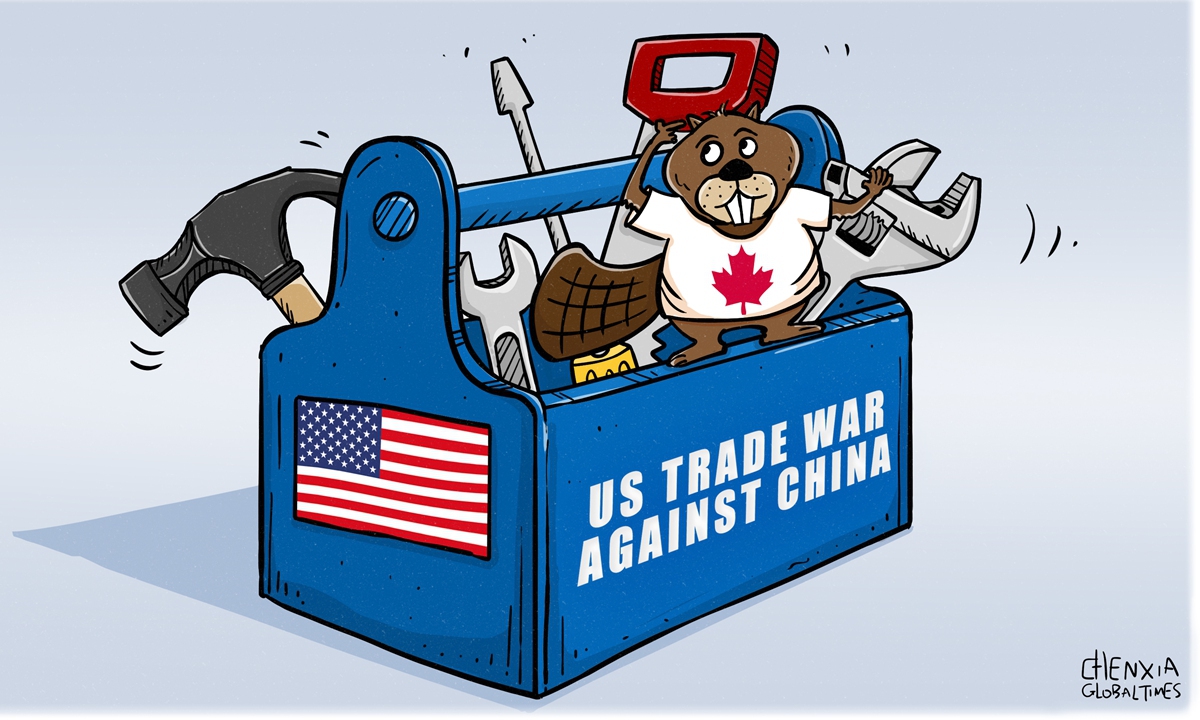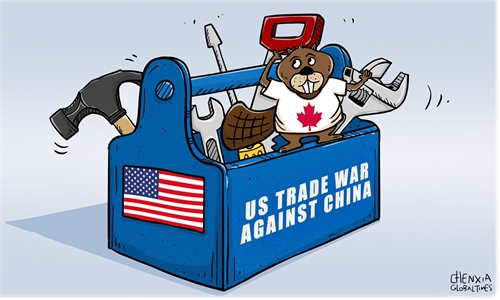
Illustration: Chen Xia/Global Times
During a recent trip to Washington, Canada's Industry Minister Francois-Philippe Champagne called on the US to invest in Canadian mineral projects to reduce reliance on China, according to Canadian media outlet CBC."What we want is certainly a decoupling: certainly from China," he told a panel hosted by the Canadian American Business Council. "People want to trade with people who, really, share the same values."
Given Canada's heavy reliance on the US' on everything from the economy to security, it is not news that Canadian officials often parrot Washington's talking points. Still, for an economic official to publicly declare that his country wants a decoupling from the world's second-largest economy and suggest Canada will only conduct trade with people with "same values," it is utterly unprofessional and actually quite laughable.
Is Canada really prepared to cut all trade with China as well as many countries around the world that it deems to have different "values"? How arrogant is this minister that he makes such absurd remarks? Here is a reminder for Minister Champagne: No country is begging Canada to conduct trade because that's not how global trade works; Do not think becoming a US puppet will make Canada itself a super power.
Apparently, Champagne is trying to appease US leaders by parroting their tough rhetoric over China in order to win economic support and investment from the US. But this will prove vain and vile in nature. The Canadian economy will not benefit from the political game of currying favor with the US, but will only suffer self-inflicted damage.
For years, Canada has tried to increase its presence in the US supply chains by strengthening various cooperation with the US. After the US established a new partnership aimed at securing the supply of critical minerals with Canada and other countries in June, Canada is now more eager than ever to increase its importance across US supply chains by securing US funding.
Yet, there are reasons why progress in mining cooperation between Canada and the US has been limited, even though the US reportedly worked to help US miners and battery makers expand into Canada so as to boost regional production of minerals used to make electric vehicles. While Canada is rich in mineral resources, its labor costs are too high for investors to operate a mine and its regulatory approval process for mining is very time-consuming, making mineral investment in Canada commercially challenging.
As the Industry Minister, Champagne knows better than anyone else how difficult and costly it is to develop mineral mining in the country. It would be delusional if the minister thinks that the "decoupling" rhetoric that aims to fawn with the US and squeeze Chinese products out of the supply chain would win US investment for the Canadian mining sector.
The so-called values-based cooperation sounds even more delusional. The US has used its hegemonic advantage to forcibly bring the global industrial chains and supply chains into division and confrontation by touting Western "values," but make no mistake, Washington is primarily driven by its own interests, not the interests of its "allies."
Champagne's "decoupling" rhetoric could be seen as a signal that Canada wants to be a cannon fodder of the US' strategy of containing China, which is irresponsible for the troubled Canadian economy.
Now that the US economy is in a downturn, the Canadian economy that is deeply tied to the US is also facing great pressure. Canada's exports fell for the second straight month in August, while nearly half of Canadians are on the brink of insolvency as rising interest rates and soaring inflation continue to weigh on household budgets, according to the MNP survey.
Against this backdrop, expanding trade cooperation with China could be a viable choice for Canada to ease its economic pressure. China has become Canada's second-largest trading partner and second-largest export destination. In the first eight months of 2022, bilateral trade reached nearly $61 billion, up 18 percent year-on-year, according to data from China's General Administration of Customs. At a time when the global economy is facing the risk of recession, such a performance underscores the resilience and complementarity of China-Canada bilateral trade.
China's economic development is by no means a challenge or a threat to Canada, but an opportunity for the country to reduce its excessive economic dependence on the US. If Canadian politicians don't understand this, they will only inflict more damage on the Canadian economy.


